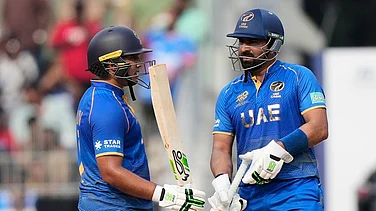Unfazed by the economic boycott by the Saudi Arabia-led bloc of countries, 2022 FIFA World Cup hosts Qatar are extremely confident of delivering a top-notch event and also expect a big contingent from India to attend football's show-piece in the Arabian Desert.
"For us, sports and politics are separate, and so we are confident that our vision and meticulous planning that has gone in over the last eight years to accomplish it, will bear fruits in 2022 irrespective of the blockade imposed on Qatar," World Cup CEO Nasser Al Khater told PTI in an e-mail interview.
"Our plan is to go smoothly irrespective of whether the illegal blockade imposed on Qatar is lifted or not," Al Khater said when queried about the Saudi-led boycott.
"We have maximised the use of alternative shipping lines and air routes since the blockade was imposed. In addition to ports of other countries in the Middle East, we have also maximised the use of shipping lines to India, China and the ASEAN regions, namely Malaysia and Singapore," he emphasised.
Noting that in the last World Cup in Russia, the Indians constituted the third biggest group of ticket purchasers from countries that had not qualified for the 2018 FIFA World Cup, the Qatar CEO insisted that things would be easier for the Indian fans.
He said, "because of Qatar's geographical proximity to India, the visa on arrival facility is extended to the Indian nationals".
Al Khater said despite an advanced cooling system being put in place in all the stadiums earmarked for the FIFA World Cup matches, "its use will be limited to ensuring that the field of play is maintained at temperatures optimum for players performance".
Stating that one of the venues -- the Khalifa International Stadium -- was ready to host matches in 2017 itself, Al Khater said that the remaining seven stadiums "will be delivered on time".
Al Khater said at the redeveloped Khalifa International Stadium "the playing area will be maintained at 23 degrees celsius right through the match despite the temperature outside being 40 degrees".
However, he also explained that during November-December, 2022, when the World Cup will take place, the temperatures will hover between 20 to 30 degrees.
"Therefore, though the cooling technology will be in place in the 2022 World Cup stadiums, its use will be limited to ensuring that the field of play is maintained at temperatures optimum for player performance," he said.
Al Khater hoped that Qatar football team, which emerged victorious at the 2019 AFC Asian Cup, will do well at the 2022 mega-event as well.
"Whilst our preparations for hosting the tournament and the Qatar Football Association's efforts in preparing Qatar national team to participate in it are not directly linked, the team's achievement has definitely instilled a fresh wave of optimism among both the citizens of Qatar as well as residents of the country belonging to other nationalities.
"The triumph we witnessed at the 2019 AFC Asian Cup is the result of many years of hard work from our colleagues at Aspire Academy and the Qatar Football Association, and we are hopeful that the national team will do us proud come 2022."
Al Khater cited India's example of hosting ICC Cricket World Cup games in a dry state like Gujarat in 2011 when asked about restrictions on consumption of alcohol with Qatar being an Islamic nation.
"Alcohol is currently available in Qatar in designated areas, including hotels for example, and this will not change in 2022. We are a conservative society but a hospitable one, and are aware that we are hosting one of the world's biggest events, sporting or otherwise, and that people from many other cultures will be visiting during the FIFA World Cup.
"Accordingly, we will ensure that there are designated areas where people who want to enjoy a drink can do so, including fan zones for example. We will also work together with FIFA to find a common ground where we respect the rights of FIFA's sponsors as well as preserve the culture and traditions of the host nation," said Al Khater.
"There are a few dry provinces in India, which have successfully hosted well-attended marquee sporting events. The ICC World Cup quarterfinal of 2011 between India and Australia in Gujarat is the most high-profile example.
"Even in the case of football, India is now witnessing a fan culture in the Indian Super League that is more family and friends-focused – with both male and female fans having a good bonding time together and at the same time supporting their favourite franchises," he further remarked.
(PTI)


























